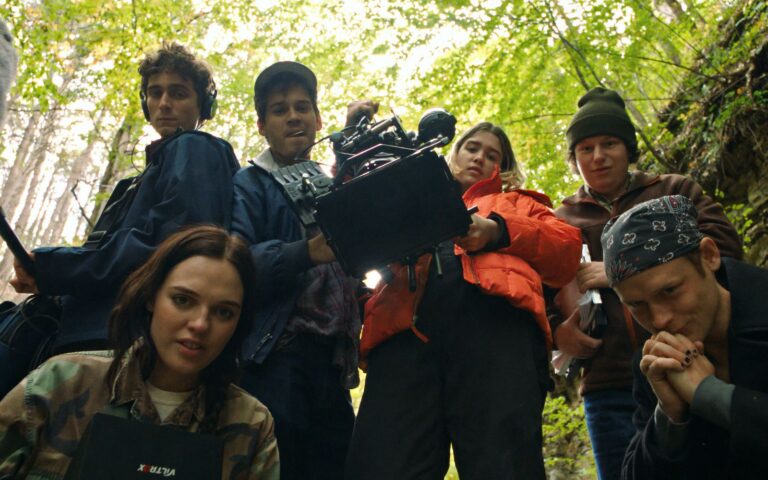By Prabhjot Bains
The director discusses the striking parallels between architecture and filmmaking, the power imbalances that plague art, and not giving a fuck.

Zia Anger is as millennial as it gets. She went to college in the late 2000s and started her filmmaking career in the early 2010s, “the real indie sleaze period” as she calls it. From 2010 to 2012, she worked on Gray, an audacious work of fiction, heir of the mumblecore genre, and her very first, yet never released feature film. A decade later, she made My First Film, her actual first film, a fragmented piece of art mourning and learning from her first attempt at filmmaking. RANGE sat down with the indie filmmaker ahead of the film’s release on MUBI.
Anger describes My First Film as “unclassifiable”. The movie is the continuation of the live performance she made in 2018 which already brilliantly melded autofiction with documentary in a tragicomic tone. A compilation of found footage, freshly shot scenes and her own digital archive, the film partly takes place behind smartphone and computer screens, encapsulating the digital native experience.
“Everybody has something like that in their lives,” she says, “like some old computer they have sitting around that they just need the right charger for or need to replace the battery and it probably has all their memories on it.” The filmmaker wanted to convey this “ephemeral digital tragedy,” which could only take form in a mixed media, almost experimental context.

Anger’s penchant for untamed art forms also shows in her cinephilia. “The one thing I’ve never been into that much is traditional cinema. I like non-traditional cinema, I like experimental films and I like reality TV.” She mentions Hollis Frampton, Kenneth Anger and Maya Deren’s films as formative to her taste and artistic process. Meshes of the Afternoon, an important film for Anger and Dina — her fictional self — makes an appearance in My First Film, alongside with the 1937 A Damsel in Distress, allowing the audience to discover or rediscover cinephile classics. Following the experimental tradition, Anger and her editors kept on adding these elements throughout the editing process, like a collage that all makes sense in the end.
Within its organized chaos, My First Film reflects on the throes of the independent film industry and the place of the auteur in the faraway yet fairly recent pre- #MeToo era. Anger bitterly recalls how indie filmmakers were ready to take unjustifiable risks in the name of realism. “When I was making the film back from 2010 to 2012, realism also meant allowing people to get really drunk,” she says. “It also meant not necessarily talking to a naked actor about if they were okay with being naked. I learned that putting people in uncomfortable positions is not fun as a filmmaker. Obviously, it’s dangerous. And also it doesn’t necessarily lead to the best filmmaking.”

Growing up as an artist, to Anger, implies coming to terms with the intangible and manifold nature of reality. “I realized that I could get more of what I wanted in a safer way if I actually just really believed in the artifice of the entire filmmaking unit surrounding me.” Sometimes, the feeling of reality is best encompassed through contrivance. Paradoxically, My First Film rings truer because of its detachment from realism, because it transcends the documentary genre and flirts with fiction, invented memories and the essayistic tone.
Although heavily introspective and thought provoking, My First Film, like its creator, does not take itself too seriously. “Essay films to me are always so smart and intellectual and I’m kind of an idiot,” she humbly tells RANGE. Anger doesn’t care about categories. She is a film snob as much as a down-to-earth person, allowing her art to be more personal and authentic, therefore accessible to a wide audience. Cinema, she realizes, is not all that deep. “There’s bigger and better parts of life than making movies,” she concludes. “But also making movies is some of the best, best parts of life in the world.”
My First Film is available on Mubi Canada from September 6.
By Prabhjot Bains
The director discusses the striking parallels between architecture and filmmaking, the power imbalances that plague art, and not giving a fuck.
By Prabhjot Bains
From electrifying horrors to genre-defying epics, these films not only entertained but challenged the way we see the world.
By Stephan Boissonneault
Inside the Montreal-based songwriter's creative space where fashion and music collide - with our friends at Brixton.